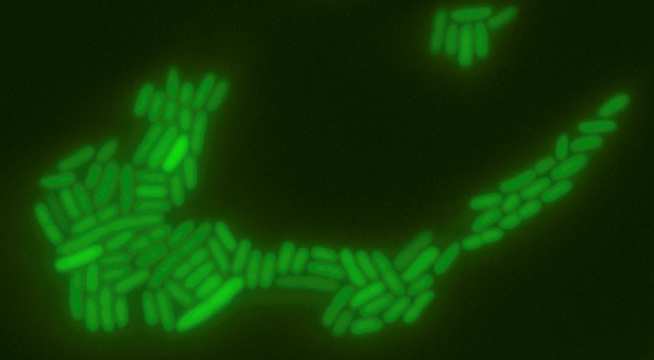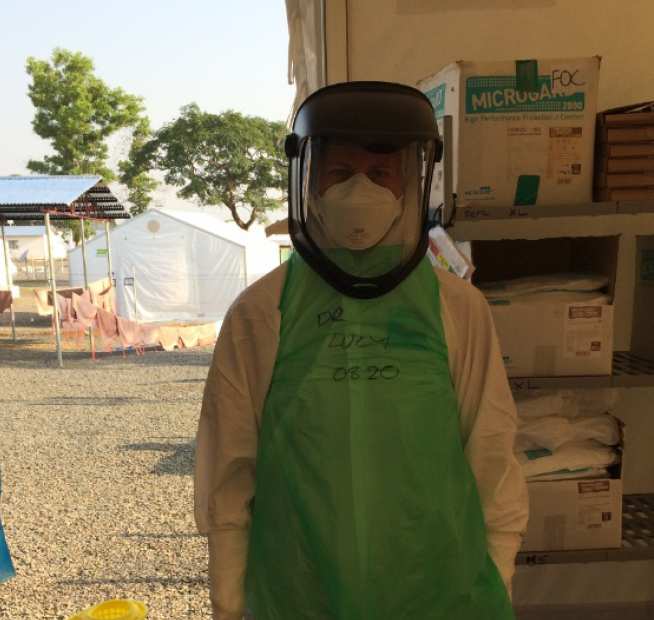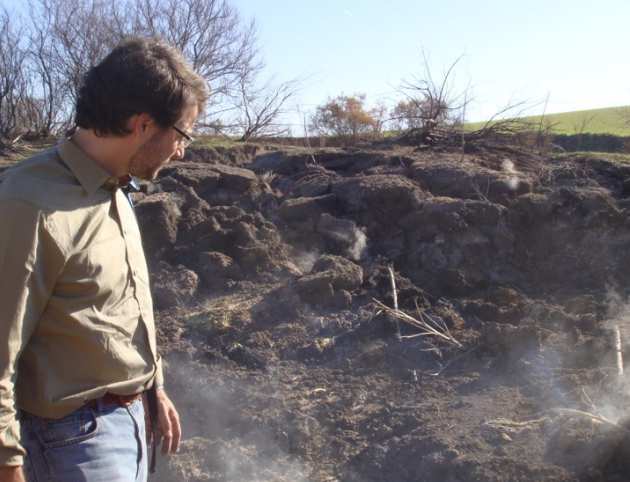The podcast is presented by Gareth Mitchell, a lecturer on Imperial's MSc Science Communication course. He’s also a longstanding BBC presenter and reporter. Gareth is joined each month by our roving reporters in the Communications Division.
If you have feedback that you'd like to share or ideas for future editions, we'd love to hear from you; please contact Gareth Mitchell.
You can also find the podcasts on most major platforms, including YouTube, Apple Podcasts, Stitcher and Spotify.
Check out other podcasts produced across the College in our podcast directory.
2014 Podcast archive
Ceramics superstar, clinical trial diaries and cycling the Silk Road
Bringing ceramics to the small screen, taking part in a clinical trial for an ebola vaccine and adventures cycling through Asia.
Download the complete podcast (mp3)
OR LISTEN TO INDIVIDUAL CHAPTERS
News: Imperial at COP21 and a celebration of general relativity – We report form the climate talks in Paris, where Imperial researchers are taking part, and look back at the centenary celebrations for Einstein’s ‘beautiful theory’ of general relativity.
Ceramics superstar – Professor Bill Lee explains how ceramics are everywhere – from computers to spaceship hulls – and why he’s appearing on BBC’s The Great Pottery Throw Down.
Ebola vaccine diaries episode 1 – What happens during a clinical trial for a new ebola vaccine? Our reporter takes part in a trial to find out.
Cycling the Silk Road – A team of medical students regale us with tales of their adventures cycling through Asia – from chin stitches to mafia weddings.
(2 December 2015)
Climate chat, bionic woman and a superstitious film
In this edition: get the low-down on climate from Lord Stern, meet a popstar obsessed with robots and follow the editor of a dramatic documentary.
Download the complete podcast (mp3)
In this edition: get the low-down on climate from Lord Stern, meet a popstar obsessed with robots and follow the editor of a dramatic documentary.
Download the complete podcast (mp3)
OR LISTEN TO INDIVIDUAL CHAPTERS
News: More neutrino joy and Cities of the Future – Five neutrino experiments and more than 1,300 scientists, including two from Imperial, are honoured in ‘the Oscars for science’, and we report back from the latest Fringe event, looking at the Cities of the Future.
Stern climate conversation – Lord Stern talks climate change, the COP21 meeting and Imperial’s new MSc in Climate Change, Management & Finance.
Fear of 13 – An Imperial alumnus and a film lecturer have put their heart and soul into a movie about a prisoner with a surprising decision – to be executed.
Bionic woman – The Scissor Sisters’ leading lady Ana Matronic meets some robot heroes and talks to Colin Smith about transcending death through technology.
(11 November 2015)
View from the Fringe, lakes on Mars and the Heart and Lung pop-up shop
The latest podcast discovers the future of design, explores the ancient lakes of Mars and takes a trip to the Heart and Lung Convenience Store.
Download the complete podcast (mp3)
OR LISTEN TO INDIVIDUAL CHAPTERS
News: Nobel prizes and preview of Cities of the Future – We round up this year’s Nobel Prizes and discover related work at Imperial, and get a preview of the next Fringe event.
Lakes on Mars – From the control centre of his office at Imperial, Dr Sanjeev Gupta drives the Mars rover Curiosity, exploring sediments that formed in ancient lakes.
Designs for Life – At a bustling Fringe, we meet engineers creating recyclable furniture, intelligent socks and innovations for disabled athletes.
The Heart and Lung Convenience Store – We take a trip to the future of heart and lung health, have a go at the lung lottery and make our own lung microbiome mix.
(21 October 2015)
In orbit, health detectives and saving joints
Meet a chemist who went into space, a geologist solving medical mysteries and a team using 3D printing to improve joint surgery in the latest podcast.
Download the complete podcast (mp3)
OR LISTEN TO INDIVIDUAL CHAPTERS
News: Naming a supercomputer and battling superbugs – The competition to give an Imperial-worthy name to an upgraded supercomputer, and the launch of an ambitious initiative to tackle drug-resistant infections.
Chemistry in space – Imperial’s new Operations Manager for the Department of Chemistry also happens to be the first Briton in space, Helen Sharman, who visited the Mir space station in 1991.
Medical geology – Dr Jennifer le Blond has just returned from a trip to Nicaragua, where she’s been trying to work out why sugar cane workers are getting chronic kidney disease – is it working conditions or something in the environment?
New tools for surgery – Dr Martin Jaere and his collaborators in the musculoskeletal lab are using advanced medical scans and 3D printing to improve the accuracy of joint surgery, potentially saving joints from amputation.
(30 September)
Difficult choices, thirsty work and Designs for Life
Difficult choices, thirsty work and Designs for Life
In the latest Imperial podcast a researcher in Kenya asks who most needs blood and we discover how internet use contributes to our 'water footprint'.
Download the complete podcast (mp3)
OR LISTEN TO INDIVIDUAL CHAPTERS
News: seabirds and sailing lessons - What businesses can learn from the America’s Cup and seabirds are under threat from a deluge of waste plastic. Plus a new device could make dialysis simpler and safer.
What’s best for the kids - Professor Kath Maitland talks about her work in Kenya, helping to improve how children are treated for shock and anaemia.
Hidden costs - PhD student Bora Ristic explains how you can save water – by spending less time on the internet.
Date for design - Research Events Officer James Romero explains how design touches on all aspects of our world ahead of the Designs for Life fringe event.
(9 September)
Tractor beams, soundscapes and time travel
Podcast: Tractor beams, soundscapes and time travel
Professor Alan Heavens gave a talk on time travel alongside a special screening to mark the film’s 30th anniversary. We asked him what period of history he would like to travel to.
At the Royal Society, Imperial researchers showed us their exhibits demonstrating 'audio zoom' technology and advanced techniques for studying individual cells in isolation.
Download the complete podcast (mp3)
OR LISTEN TO INDIVIDUAL CHAPTERS
News: gene therapy and power plants – Encouraging results from a cystic fibrosis clinical trial and a project to deliver electricity to rural India. Plus, we pick some great days out in South Kensington.
Single cell science - Duncan Casey describes how his team use tractor beams to capture individual cells in a sample at the Royal Society Summer Science Exhibition.
The science of time travel - Professor Alan Heavens discusses the physical concepts behind Back to the Future, and what he would do with a time machine.
Soundscapes - Clement Doire explains the 'audio zoom' technology his team are demonstrating at the Royal Society Summer Science Exhibition.
(15 July)
Autopsies, antelopes and crocodiles
imperial podcast autopsies antelopes and crocodiles/
Our latest podcast hears about why hospital autopsies are becoming rarer, and the mysterious death of saiga antelopes in Kazakhstan.
Plus, we have expert advice on how to avoid crocodile attacks, and Professor James Barlow discusses similarities in the culture of innovation between the healthcare and finance industries.
Download the complete podcast (mp3)
OR LISTEN TO INDIVIDUAL CHAPTERS
News: croc attacks and parenting – A new publication provides advice on how to avoid getting attacked by a crocodile, and a study suggests that people learn parenting behaviour from their mothers.
The death of the autopsy? – Angus Turnbull discusses his research on how hospital autopsies are becoming less common in the UK.
Saiga die-off – Professor E.J. Milner-Gulland on the mysterious death of about half the world’s population of saiga antelopes in two weeks.
Innovation in healthcare - Professor James Barlow discusses similarities in the culture of innovation between the healthcare and finance industries.
(24 June)
Ebola vaccines, parasites and citizen science
imperial college podcast 3 june 2015/
Vaccine trials seeking volunteers, a fossil that could solve a mystery, and a new phase for the Opal project.
Download the complete podcast (mp3)
OR LISTEN TO INDIVIDUAL CHAPTERS
News: antineutrinos and diabetes – The quest to explain why matter survived the Big Bang continues, and questions arise over India’s diabetes screening programme.
Ebola vaccine trials – Imperial is recruiting healthy volunteers to take part in the first trials of two new Ebola vaccines. (Full story)
Parasite mystery – Pentastomids, which live inside vertebrates, have been around for much longer than their hosts – so how did they live before? Dr Mark Sutton explains how a new fossil discovery provides an answer.
Opal expands – As Imperial’s environmental citizen science project rolls out across the UK, David Slawson tells us what we’ve learnt so far.
(3 June)
Sound and light at the Imperial Festival
imperial college podcast 13 may 2015/
The podcast finds researchers telling visitors about 3D printing, Lego instruments and snot at the Imperial Festival.
The College’s annual public showcase began with a blast of trumpets and a battering of drums from the band of the Household Cavalry. Over the weekend, thousands of visitors of all ages interacted with Imperial scientists and their work.
Podcast reporter Sarah Gaunt, a Science Communication MSc student, spoke to a few of the researchers taking part. Plus, we go back 480 million years into the Earth’s history to see what ancient creatures dominated the environment.
Download the complete podcast (mp3)
OR LISTEN TO INDIVIDUAL CHAPTERS
News: musical revolutions and extending lifespans – The news team discuss the latest Imperial research on the evolution of pop music and a study forecasting how life expectancy will change in England and Wales by 2030.
Imperial Festival highlights 2015: part one – A giant nose reveals how we defend ourselves against viruses and bacteria, and a light spectrometer proves that complex scientific instruments can be made from Lego.
When sponges ruled the Earth – Naomi Jordan explains what newly found fossils tell us about the creatures that dominated in the Ordovician period, 480 million years ago.
Imperial Festival highlights 2015: part two – Researchers demonstrate what you can make with a 3D printer and use chocolate to demystify clinical trials.
(13 May)
Mental health, synthetic biology and crater science

An app for anxiety, a stress gauge for cells and a mission to Mexico.
Download the complete podcast (mp3)
OR LISTEN TO INDIVIDUAL CHAPTERS
News: T cells and the Imperial Festival – A discovery that could lead to a new cancer therapy and a look ahead to our big event on 9-10 May.
Apps for mental health – Sarah Jones talks about her work to develop an app to help people overcome anxiety and a chance for Imperial Festival visitors to voice their own thoughts about mental health.
A light bulb moment in synthetic biology – Dr Tom Ellis explains how his team have developed a method to measure the burden placed on cells by adding components.
Expedition to sample the Chicxulub crater - Dr Joanna Morgan is part of an international team that will drill into the seabed off the coast of Mexico next year to take samples from the crater of the asteroid that killed the dinosaurs.
(22 April)
Antarctica, giant cells and the Dyson School

Professor Martin Siegert discusses the risk of Antarctic ice melting. Also in the podcast, we hear about Imperial’s partnership with Dyson to launch a school of design engineering, and how giant cells can contribute to bone diseases.
OR LISTEN TO INDIVIDUAL CHAPTERS
News: Old brains and the Imperial festival – A new study on how head injuries may accelerate ageing in the brain, and a look ahead at our big event on 9-10 May.
Bone-eating giants – Immune cells can fuse together to form giant cells with many nuclei. Dr Jacques Behmoaras is investigating why this happens and how these cells are involved in osteoporosis.
Ocean water melting Antarctic ice sheet - Professor Martin Siegert talks about the recent findings from his survey of Totten Glacier in East Antarctica, and working as a scientific explorer.
Dyson to open design engineering school – Professor Peter Childs on Imperial’s new partnership with Dyson and his hopes for students to launch businesses.
(25 March)
LKCMedicine, Ebola, and the dinosaurs' demise

An update from Imperial's new medical school in Singapore, an Ebola doctor's story and new research on how the dinosaurs were wiped out.
OR LISTEN TO INDIVIDUAL CHAPTERS
News: NHS, stegosaurus, flu – New findings on how austerity has affected some NHS treatments, how much a stegosaurus weighed, and how often people catch flu.
LKCMedicine: a success story – Professor Jenny Higham discusses how Imperial partnered with Nanyang Technological University to establish a new medical school in Singapore, which opened in August 2013.
On the Ebola frontline - Dr Lucy Lamb, a clinical research fellow in the Department of Medicine, talks about her experience as an army doctor working in an Ebola treatment centre in Sierra Leone.
Scientists doubt fire killed dinosaurs - An asteroid impact may have wiped out the dinosaurs, but recent research suggests the impact didn’t cause a global firestorm, as Dr Guillermo Rein (Mechanical Engineering) explains.
(4 March)
Tinnitus, appendectomies and peat fires
 An award-winning radio feature on tinnitus, a new study on appendix surgery, and how dried-out peatlands are causing mega fires.
An award-winning radio feature on tinnitus, a new study on appendix surgery, and how dried-out peatlands are causing mega fires.
OR LISTEN TO INDIVIDUAL CHAPTERS
Days and nights out at Imperial – A look ahead at upcoming events on campus, including Arts Fest and Imperial Fringe ‘Lit Up’.
Appendectomy: better outcomes at specialist centres - Dr Sonia Saxena discusses her recent study comparing results at different hospitals for children having their appendix taken out.
Sound in Silence - Science Media Production MSc student Anand Jagatia discusses his award-winning radio feature about a musician with tinnitus. Hear Anand's feature in full at Soundcloud.
Mega fires – Dr Guillermo Rein explains how peatlands are drying out and becoming flammable, leading to some of the biggest fires on Earth.
(11 February)
Plant pathogens, medical apps and the "Machine Gunner"

Two PhD students share their delight at winning £20,000 investment for their research project on plant pathogens.
Professor Stephen Richardson, who won a CBE in the New Year Honours, explains how he got the nickname “Machine Gunner” for his fast-talking habit.
And PhD student Kit Huckvale explains how his app, SiKL, will help patients with sickle cell anaemia keep their medical records.
OR LISTEN TO INDIVIDUAL CHAPTERS
News: heart disease and ailing doctors – Imperial scientists identify mutations linked to dilated cardiomyopathy, paving the way for more accurate genetic diagnosis. Plus, a study suggests that complaints procedures are causing psychological illness in doctors and putting patients at risk.
Medical records go mobile – The SiKL app, designed by PhD student Kit Huckvale, aims to help sickle cell anaemia patients keep track of their care.
Prize pitch – The Institute of Chemical Biology’s Dragon’s Den-style competition gave doctoral students a chance to win £20,000 by pitching their projects to a team of experts. The winning team, Fungi Alert, have developed a device that gives farmers early warning of possible infection by plant pathogens in the soil.
Professor Stephen Richardson: ‘The Machine Gunner’ – Imperial’s Associate Provost (Institutional Affairs) talks about his recent CBE award, the challenge of remembering students’ names, and how his quick-fire delivery earned him his nickname.
(21 January)








